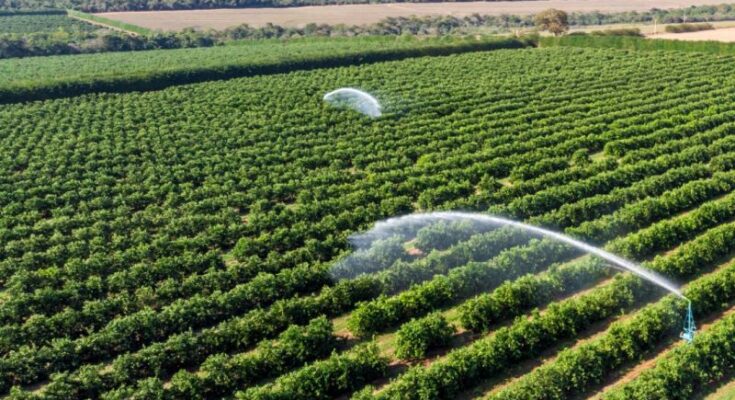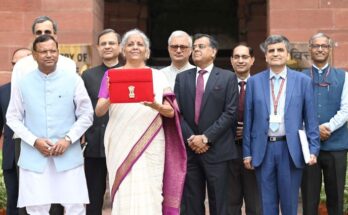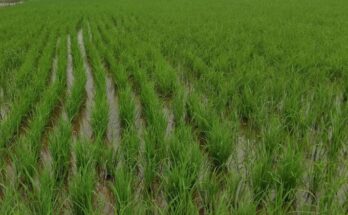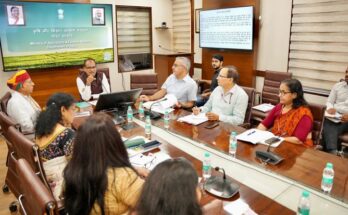Adopting a sustainable approach to practicing agriculture should involve meeting the demands of key stakeholders including farmers and consumers as well as ecology. The production system needs to spread horizontally beyond the agronomic crops by focussing on the nutritional need of the consumers. We need to move from primary to secondary agriculture by reducing food waste, increasing shelf life, connecting to the markets, meeting different tastes and preferences, Dr Ashok Dalwai, CEO, National Rainfed Area Authority, Ministry of Agriculture & Farmers Welfare, Government of India said while speaking at FICCI’s Agriculture Summit and Awards on Thursday.
“We must also now focus on Ecosystem-Based Agriculture (EBA), which goes beyond Integrated Farming Systems (IFS). The difference between EBA and IFS or ILS (Integrated Livelihood System) is that it considers the need for a participative approach to the practice of agriculture,” he said.
Dr Dalwai also said, “The first principle of sustainability, before we talk about improved technology among others, is to have a more egalitarian management system that will consider tapping the resources in a more efficient and sustainable manner by broadening our approach to the agriculture technology and practices. When this happens, we would have diversified our agricultural production, consumption plates of our people and therefore will be less likely to burden our ecology.”
Sustainability needs to start from research and development. The other paradigms shift that must happen is in secondary agriculture and that is where the industry has a role to play. This shift will lie in digital technology, fintech, controlled atmospheric production systems and change in the extension systems. The way forward is how we organise our agricultural system, he added.
Speaking on the occasion, Dr Sudhanshu, Secretary, Agricultural and Processed Food Products Export Development Authority (APEDA), complimented FICCI on acknowledging the industry for the initiatives taken towards farmer’s income enhancement. “In this transformation of agriculture in the last seven decades, starting from the Green Revolution to the White Revolution, and now leading to sustainable agriculture, the agricultural policies by the government, supported by the stakeholders, we have now come to a stage where from being a net importer, we have become a leader in agricultural production and now play an active role in agri-exports,” he said.
You may also like to read: Growing popularity of exotic fruits and vegetables in the Indian market
The country has immense potential to revolutionise the agri-basket and horticultural basket of the country. We have been able to not only tap the middle east market but the quality conscious market of Europe as well, he further added.
Addressing the summit, TR Kesavan, Chairman, FICCI National Agriculture Committee & Group President, TAFE, said that cutting down wastage at the farm gate was the first step to sustainability. The second part of sustainability was to preserve what you grow. “India can be a food bowl for many countries. The central government has done a lot to change the agricultural policies that have added phenomenal strength to agriculture,” he noted.
Sanjay Sacheti, Co-Chair, FICCI National Agriculture Committee & Executive Director & Country Head, Olam Agro India said that sustainable agriculture has two aspects– farmer livelihoods, and promoting resource use efficiency in agriculture. “There is a huge opportunity in the commodity value chain where industry participates through appropriate risk-taking and with the right level of entrepreneurship,” he said.
Rahoul Sawani, President – South Asia, Corteva Agriscience said that globally, the current climate challenges continue to demonstrate the critical role of sustainable practices and the vulnerability of the value chain in agriculture. It has demonstrated the need for smart and sustainable agriculture by putting the Indian farmer and their needs and aspirations at the centre of the engagement. Corteva Agriscience is committed towards enriching lives together through sustainability. The efforts and on-ground work of the company with the farmer communities are aligned to protect the food systems and enhance the lives of the region’s most vulnerable to build a more sustainable and equitable future.
The FICCI-YES Bank Knowledge Report- India beyond 75: Envisioning Smart & Sustainable Agriculture was also released at the event.
Speaking at the occasion, the knowledge partner of the initiative, Sunjay Vuppuluri, National Head, Food & Agribusiness Strategic Advisory & Research (FASAR), YES Bank said, “Indian Agriculture has grown phenomenally over the last seven decades since independence. While this growth has aptly addressed the food security needs of the nation till now, the agriculture sector faces new challenges – as expectations from agriculture diversify beyond food security, towards sustainable and climate-resilient production. For a country that has to feed 17 per cent of the global population with only 11 per cent of the global arable land, there is an immense need for the private sector, academia and the community at large to partner with the government and develop sustainable agricultural production systems which enable food security for all, in an ecologically sound, economically viable, and socially responsible manner.
Sundar Raja Vadlamani, President-Supply Chain, SeedWorks said, “Seed being a primary input has the onus of ensuring food security. The right seed, right technology and the right environment are the keys to sustainability and prosperity.
Suketu Doshi, Director, Sulphur Mills mentioned that serving agriculture with technology innovation could relish nutritious food produced in farms across the globe.
The winners of the FICCI Sustainable Agriculture Awards 2021 were also felicitated at the event.




